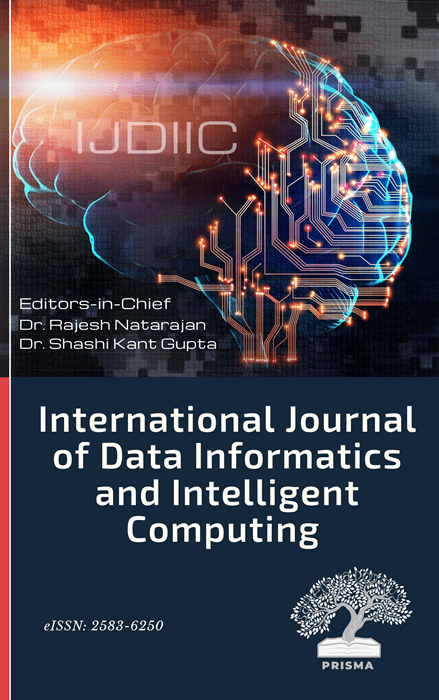Intepretable Deep Gaussian Naive Bayes Algorithm (Idgnba) Based Task Offloading Framework for Edge-Cloud Computing
DOI:
https://doi.org/10.59461/ijdiic.v2i2.57Keywords:
Internet of Things (IoT) , Edge computing , Task offloading , Interpretable deep Gaussian , Naive Bayes approach (IDGNBA)Abstract
When it comes to Internet of Things (IoT) applications and machine learning based computing, resource-restricted edge devices are inadequate due to the exponential growth of mobile information and the massive need for processing power. An edge offload, the migration of complex tasks from IoT devices to edge cloud servers, is a distributed computing paradigm that has the potential to overcome the IoT device resource limits, lessen the computational load, and increase the effectiveness with which activities are processed. However, due to the NP-hard nature of the optimum offloading decision-making issue, an efficient solution using traditional optimization techniques is difficult. Current deep learning algorithms still have a lot of problems, such as their slow pace of learning and limited ability to adapt to new environments. We provide a unique interpretable deep Gaussian naive Bayes technique (IDGNBA) for extremely fine offloading choices to address these issues. Through several simulation studies, we assess the efficacy of IDGNBA and find that it performs better in terms of offloading than traditional techniques. The model has strong mobility and can quickly adjust to a fresh MEC working atmosphere while taking offloading decisions in real-time.
Downloads
References
Y. Ai, M. Peng, and K. Zhang, “Edge computing technologies for Internet of Things: a primer,” Digit. Commun. Networks, vol. 4, no. 2, pp. 77–86, Apr. 2018, doi: 10.1016/J.DCAN.2017.07.001.
D. Wu, G. Shen, Z. Huang, Y. Cao, and T. Du, “A Trust-Aware Task Offloading Framework in Mobile Edge Computing,” IEEE Access, vol. 7, pp. 150105–150119, 2019, doi: 10.1109/ACCESS.2019.2947306.
A. Naouri, H. Wu, N. A. Nouri, S. Dhelim, and H. Ning, “A Novel Framework for Mobile-Edge Computing by Optimizing Task Offloading,” IEEE Internet Things J., vol. 8, no. 16, pp. 13065–13076, Aug. 2021, doi: 10.1109/JIOT.2021.3064225.
H. Liao, Y. Mu, Z. Zhou, M. Sun, Z. Wang, and C. Pan, “Blockchain and Learning-Based Secure and Intelligent Task Offloading for Vehicular Fog Computing,” IEEE Trans. Intell. Transp. Syst., vol. 22, no. 7, pp. 4051–4063, Jul. 2021, doi: 10.1109/TITS.2020.3007770.
A. K. Shukla and V. Suresh Kumar, “Cloud Computing with Artificial Intelligence Techniques for Effective Disease Detection,” Int. J. Data Informatics Intell. Comput., vol. 2, no. 1, pp. 32–41, Mar. 2023, doi: 10.59461/ijdiic.v2i1.45.
X. Zhang, R. Zhou, Z. Zhou, J. C. S. C. S. Lui, and Z. Li, “An Online Learning-Based Task Offloading Framework for 5G Small Cell Networks,” in 49th International Conference on Parallel Processing - ICPP, New York, NY, USA: ACM, Aug. 2020, pp. 1–11. doi: 10.1145/3404397.3404417.
M. Gali and A. Mahamkali, “A Distributed Deep Meta Learning based Task Offloading Framework for Smart City Internet of Things with Edge-Cloud Computing,” J. Internet Serv. Inf. Secur., vol. 12, no. 4, pp. 224–237, Nov. 2022, doi: 10.58346/JISIS.2022.I4.016.
J. Almutairi and M. Aldossary, “A novel approach for IoT tasks offloading in edge-cloud environments,” J. Cloud Comput., vol. 10, no. 1, p. 28, Apr. 2021, doi: 10.1186/s13677-021-00243-9.
H. A. Alharbi, M. Aldossary, J. Almutairi, and I. A. Elgendy, “Energy-Aware and Secure Task Offloading for Multi-Tier Edge-Cloud Computing Systems,” Sensors, vol. 23, no. 6, p. 3254, Mar. 2023, doi: 10.3390/s23063254.
K. I. Jones and S. R, “Information Security: A Coordinated Strategy to Guarantee Data Security in Cloud Computing,” Int. J. Data Informatics Intell. Comput., vol. 2, no. 1, pp. 11–31, Mar. 2023, doi: 10.59461/ijdiic.v2i1.34.
S. Alhelaly, A. Muthanna, and I. A. Elgendy, “Optimizing Task Offloading Energy in Multi-User Multi-UAV-Enabled Mobile Edge-Cloud Computing Systems,” Appl. Sci., vol. 12, no. 13, p. 6566, Jun. 2022, doi: 10.3390/app12136566.
H. Wu, K. Wolter, P. Jiao, Y. Deng, Y. Zhao, and M. Xu, “EEDTO: An Energy-Efficient Dynamic Task Offloading Algorithm for Blockchain-Enabled IoT-Edge-Cloud Orchestrated Computing,” IEEE Internet Things J., vol. 8, no. 4, pp. 2163–2176, Feb. 2021, doi: 10.1109/JIOT.2020.3033521.
Z. Zhang, N. Wang, H. Wu, C. Tang, and R. Li, “MR-DRO: A Fast and Efficient Task Offloading Algorithm in Heterogeneous Edge/Cloud Computing Environments,” IEEE Internet Things J., vol. 10, no. 4, pp. 3165–3178, Feb. 2023, doi: 10.1109/JIOT.2021.3126101.
A. M and S. M, “Dynamic Mobile Cloud Eco System Security - A Review,” Int. J. Data Informatics Intell. Comput., vol. 2, no. 1, pp. 62–69, Mar. 2023, doi: 10.59461/ijdiic.v2i1.44.
Z. Cheng, Z. Gao, M. Liwang, L. Huang, X. Du, and M. Guizani, “Intelligent Task Offloading and Energy Allocation in the UAV-Aided Mobile Edge-Cloud Continuum,” IEEE Netw., vol. 35, no. 5, pp. 42–49, Sep. 2021, doi: 10.1109/MNET.010.2100025.
J. Almutairi, M. Aldossary, H. A. Alharbi, B. A. Yosuf, and J. M. H. Elmirghani, “Delay-Optimal Task Offloading for UAV-Enabled Edge-Cloud Computing Systems,” IEEE Access, vol. 10, pp. 51575–51586, 2022, doi: 10.1109/ACCESS.2022.3174127.
X. Zhang, H. Zhang, X. Zhou, and D. Yuan, “Energy Minimization Task Offloading Mechanism with Edge-Cloud Collaboration in IoT Networks,” in 2021 IEEE 93rd Vehicular Technology Conference (VTC2021-Spring), IEEE, Apr. 2021, pp. 1–7. doi: 10.1109/VTC2021-Spring51267.2021.9449054.
Downloads
Published
How to Cite
Issue
Section
License
Copyright (c) 2024 Prabhdeep Singh

This work is licensed under a Creative Commons Attribution-ShareAlike 4.0 International License.








